#czech history
Text
Your not so friendly reminder that 76 years ago Klement Gottwald "just returned from the Castle".
#čumblr#czech history#“i've just returned from the Castle” was a first sentence of Gottwald's speech#in which he announced that now all the power was in the hands of the communistic party#and it held it for another 41 years#during this time communists managed to murder imprison and destroy careers and lives of countless people#they destroyed the economics and the environment#they destroyed everything they could#communism#history#modern history
103 notes
·
View notes
Text
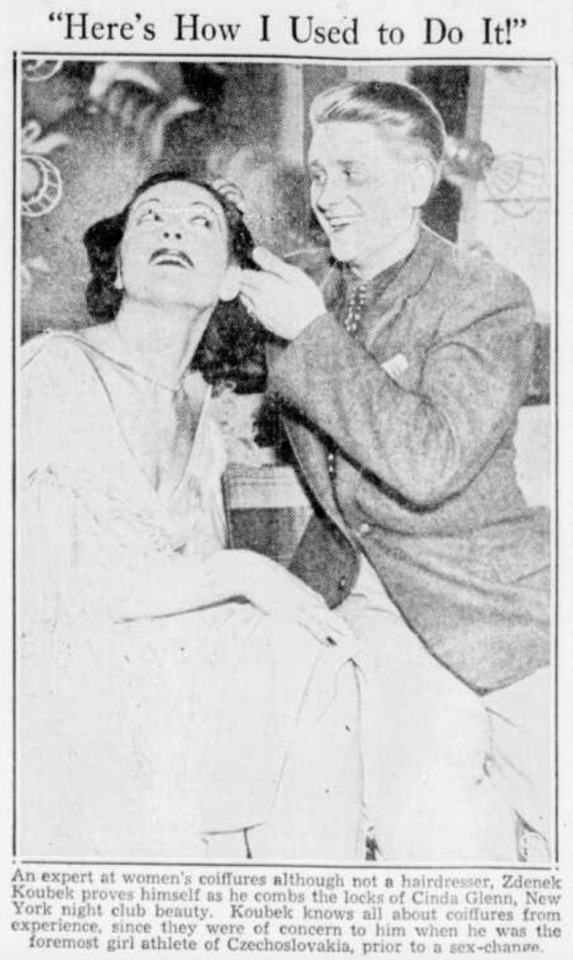
ID: a black and white photo and caption from a newspaper showing a young white trans man with light hair wearing a tweed jacket and high collar smiling at a young white woman in a pale dress as he brushes her mid-length dark hair. She is smiling at him from the slightly complex angle as he brushes her hair. The photo is faded and not great quality but their faces are clear.
The headline over the photo is “Here’s How I Used To Do It!”
The caption below reads “An expert at women's coiffures although not a hairdresser, Zdenek Koubek proves himself as he combs the locks of Cinda Glenn, New York night club beauty. Koubek knows all about coiffures from experience, since they were of concern to him when he was the foremost girl athlete of Czechoslovakia, prior to a sex-change.”
Zdenek Koubek was born in Paskov, Czechoslovakia (at the time) in December 1913, one of eight siblings, and competed as an athlete. With minimal formal training, he began running at age 17, decided to pursue it formally aged 19, and broke two world records at the 1934 world olympics.
Because queer and gender-diverse history is complex, I’m genuinely unsure if Zdenek was intersex. He seems to have been pretty gender-nonconforming when read as a woman in his early life and seems to have retired from athletics because he was harassed by people wanting him to undergo invasive “gender checks” after his gold medals at the 1934 Olympics.
Apparently the current obsession with “defining gender in sport” has roots back to the 1930s. Athletes competing in female athletics have been forced to undergo a variety of examinations for the purpose of declaring them “female enough”. They seem to have never been pleasant, appropriate, or anything other than invasive and dehumanising, and they seem to have always focused on a) defining gender by physicality b) defined that physicality in fairly arbitrary ways that are actually incredibly difficult to relate to anything objective, despite a veneer of scientific objectivity.
I can entirely see why the threat of such harassment would have caused Zdenek to decide an athletic or adjacent career wasn’t worth undergoing it, whether he personally believed himself to be intersex or whether we would recognise him as such today. The term “intersex” has many definitions, and is often challenged by medical professionals if it could potentially cover too many people - e.g. medical professionals have repeatedly challenged the term when used by AFAB people with PCOS, which can cause fertility issues, hirstutism etc, purely on the grounds of “that would make around 10% of women intersex”. Zdenek simply publicly stated “I was wrongly assigned as female at birth” without giving any other details - as he had *every* right to. Some historians have characterised him as intersex based on this, and others simply as trans; he appears, very reasonably, to have preferred to preserve his privacy on the details.
Zdenek went on a lecture tour of the US talking about his life and transitioned in 1936. At the time of this photo, he was pursuing a career in cabaret in the US. He seems to have been reasonably successful but never settled there, returning home and marrying a cis woman with whom he lived happily for the rest of his life, dying in Prague aged 72 in 1986.
He joined a local rugby team along with his brother Jaroslov after WWII and seems to have been an enthusiastic amateur player. I hope he got a lot of joy out of it, which he does seem to have.
Like so many queer and trans histories, Zdenek’s is somewhat obscured because so much of what has been written about him is always skewed by the writer’s own perspectives about gender and transness. Including the drive to impose a false binary on trans experience - which I as a nonbinary person know is certainly not universally present.
There are, of course, *absolutely* trans people who always have a strong feeling of gender equating to “knowing they are a boy/girl from an early age”, and I in no way wish to erase them or their experiences, but it must also be noted and acknowledged there are plenty of us with different experiences. There are people like me who feel “wrong” in our assigned gender from pretty early in life, all the way down to having quite strong dysphoria in puberty and afterwards, but don’t strongly ID as the “opposite” binary gender either. There are people who rub along fine in their assigned gender, or who have many issues with it but don’t know what they equate to, until they have some experience presenting otherwise and suddenly experience strong gender euphoria for the first time in their lives. There are people who never feel anything much at all about gender and only ever do any identifying purely as a matter of convenience because a very binary society requires it.
Cis people seem to find the “always knew/born in the wrong body” narrative the easiest to relate to, and I can only assume that is because it is the narrative that allows them to challenge our society’s gender-essentialist, binarist worldview the *least*. It is considerably easier, and requires much less thought and critical attention, to say “I guess sometimes the occasional person is just mistakenly assigned to the wrong category” than to question those categories, why they exist, what they actually are, how they are imposed, and whether they actually mean anything at all in an objective sense.
I have no idea where Zdenek fell on any of this, or if his experience was very different in another way.
I posted this to, as ever, note that we are not a new phenomenon. Trans people are part of human history. We have always existed. We have always contributed. The way the society we lived in perceived us *and* how the societies our stories have passed through perceived us affect how our stories are told today, and those things can make it complex to uncover the lived experience of the trans person behind all of that. Queer and trans history must always be about acknowledging those facts and uncertainties while doing our best to find out as much as possible about the actual lived experiences of our siblings in the past.
#trans#trans history#queer history#czech history#sports history#historiography#nonbinary#trans historian#nonbinary historian#queer historian#trans man#historical trans man#historical trans person#20th century history#modern history
99 notes
·
View notes
Text
∗❀𓇣❁introducing you the south bohemian culture❁𓇣❀∗
ok so since noone really cares about south bohemian culture anymore, i'll to try to embrace it here on my blog, at least so that people know it exists. for the ones who don't know, Bohemia is an area in Czechia, that takes up most of the country. in czech, it is called 'Čechy'. now, you might notice the similarity between the words chechia and čechy - yes, my whole country is called after this part of it, even though it contains three regions: Bohemia (Čechy), Moravia (Morava) and Silesia (Slezsko). moravians and silesians take care of their culture pretty well in these trying times, but the bohemians, being the most influenced by the west culture, usually don't. so here's me, the tiniest person on tumblr, trying to do something about it! yay!!
❀first i'd like to say something about the name of this entire region. so according to an old, veery old myth, at first, all the slavic tribes lived in one place, 'v matičce Rusi' (in the mother of all, Russia). But the tribes and families started to lack space for their houses, animals and children, and thus two brothers, Čech and Lech, decided to go search for a new place for them. they went a long, long way, until they came to today's czechia, specifically to the mountain Říp (it actually exists). the forefather Čech climbed on the top of it, he looked around and saw, that they came in their promised land. it had beautiful mountains on the sides and fertile meadows in the middle, miles and miles of dark woods, and it was rich in milk and honey. and when he asked what it should be called, the slavs shouted in excitement that it should be called after the forefather himself. (i love this story a lot<3)
❀next post is going to be about the south bohemian region itself and it's parts! i'm planning on still posting art on this blog, but making it more representing of my slavic culture. i hope someone finds this interesting!
also sorry if i made any english mistakes :)
#slavic#rumour#old story#old rumour#slavic legend#slavic culture#čumblr#czechia#czech culture#bohemia#bohemian culture#south bohemia#obrozujeme#slavic representation#culture#history#slavic history#czech history#czech legend
61 notes
·
View notes
Text
JUST IN: Hra na hrad, pt. 1
Školák se ztrácí své třídě při prohlídce Hradu, když následuje zbloudilou kočku, a je katapultován do desátého století. Zvládne se vrátit zpátky do současnosti? Nebo pohoří na tom, že si nedokáže zapamatovat slovo skriptorium? Může být dětská hra z nultých let tzv. relatable pro zilleniální publikum? Dokáže naplnit mnou slíbený (nejen memetický) potenciál? A co Jan Tleskač?
youtube
Tumáš, čumblre, první díl. A já slibuju, že jednou udělám i verzi bez svého komentáře.
(btw, mám pocit, že je tam místy slyšet, jak mi do mikrofonu vrní kocour. I proto si to určitě chcete pustit.)
14 notes
·
View notes
Text

"It's a beautiful world when I get up in the morning and see how already the sun shines brightly.
In the morning air, everything is bathed in dew. Even old trees somehow seem to look younger when the dewdrops on the leaves shine like diamonds and gleam like rubies on fire."
Barbora Vana
[From the autograph book of Rose (Vana) Vlasak]
[circa 1931-1939]
#Notes by Nikki#my family#family#positivity#words of affirmation#I just thought that my great-great grandma's words#were very sweet#czech#czech language#czech history#beautiful#poetry#poetic#trascribed
30 notes
·
View notes
Note
ask game: 1, 26, 27
Thanks for the asks!
1. Who is your favourite historical person?
I have a lot of favourites, so it's hard to choose! But I'd have to go with Camille Desmoulins. He was very talented, though he arguably kept making bad life choices. I also really appreciate his views on divorce and women's rights in general (it was far from perfect but I'd argue it was quite progressive for its time). Him and Lucile seemed to have a genuinely nice relationship. And, judging from the anecdotes I've read, there just seems to be something deeply human about him, reflected in a way in which he reacted to the things happening around him.
For a woman from history, I'd have to go with Émilie du Châtelet. I devoured the book of her collected writings yesterday, so I'm very biased at the moment. I definitely think that she must have been one of the brightest minds in the 18th century. Her writings on the role of women and happiness just really resonate with me. Her life story is a bit all over the place but very entertaining, until it gets tragic.
26. Forgotten hero we should know about and admire?
This is a story on a very small scale, but I've recently learnt about Jindřiška Nováková and it really moved me. She was only 14, yet she participated in the resistance during the time in which Czechia was occupied by Nazi Germany. She helped to move and hide a bike used by one of Heydrich's assassins, which may not seem like much, but back then, it meant risking not only her life but also that of her family. Someone reported it and she was taken away for questioning, and yet she didn't reveal anything.
Unfortunately, she was later killed in the Mauthausen concentration camp, making her the youngest victim there.
27. Favourite historical “ What if… ” ?
Oh, that's a good one! I don't really have the sufficient expertise to answer it, but I sometimes wonder if things would be different if the US came to help the French people during the revolution? Namely in a form of a military aid?
I'm not sure if things would be better, but it's an interesting thought.
Though maybe it's just residue from my past amrev obsession and the echoes of Cabinet Battle stuck in my brain.
#ask game#ask away#french revolution#camille desmoulins#émilie du châtelet#frev#amrev#nazi germany#czechia#czech history#history#20th century#18th century#1700s#ask tag#frev community
7 notes
·
View notes
Text
Who ordered the death of king Wenceslaus III?
It's early afternoon of August 4th 1306 in beautiful Olomouc, Margraviate of Moravia. The young Bohemian king Wenceslaus III is a guest of the bishop, who offered him his hospitality on king's campaign to Poland. Václav had recently resigned his position as the king of Hungary, but now he's determined to defend his hereditary claim to the Polish crown.
Wenceslaus had just finnished lunch and decided to rest in private chambers. Suddenly there's a scream and the guards catch Konrad of Mulhov (1), a German knight, with a bloodied blade just outside of king's chambers. The king lies inside, stabbed to death. His death means the end of the Přemyslids, who had ruled Bohemia for over 400 years.
Konrad is killed immediately. We have the name of the killer (unless of course he was being framed), but even 700 years later we don't know who paid for king Wenceslaus' death. Even sources of that time can't agree on the culprit.
Elizabeth of Töss - a Hungarian princess, the last member of the House of Árpád. She was betrothed to Wenceslaus once. A king of Hungary and heir to the Bohemian throne is quite the catch. But once Wenceslaus gave up the Hungarian crown, the engagement was terminated. After this Elizabeth never got married and spent the rest of her life in a closter. The loss of an advantageous marriage and feelings of being betrayed seem like enough of a motive. But did Elizabeth have good enough connections to get a murderer right into king's chambers?
Charles Robert of Anjou- Wenceslaus took the Hungarian crown (thanks to his fathers political machinations) under quite tumultuous circumstances. After the previous king of Hungary got murdered, Charles Robert of Anjou was Wenceslaus' main opponent in pursuit of the crown and Wenceslaus' success only fanned the flames of opposition. It would make sense for Charles to get rid of his greatest rival. However when Wenceslaus gave up the Hungarian crown, he did so in favor of Otto of Bavaria. Would Charles ignore this new threat and arrange the death of his former rival?
Albert I of Germany - the king of Holy Roman Empire. Not too long ago he waged war Wenceslaus' father to slow down his rise in power. And even though he and Wenceslaus had made peace, the king of Bohemia still has a lot of power in the Empire. Plus since Wenceslaus has no legitimate children, if he dies, Bohemia will fall right into Albert's lap. After all, a few months after Wneceslaus' death Albert attacked the Bohemian kingdom to claim it for his son Rudolph. But had he been the culprit, would he wait that long?
Władysław I Łokietek - he's not happy with the Přemyslids ruling over Poland and would in fact like to claim the Polish crown for himself. He'd been campaigning against them for the past two years and now that Wenceslaus is coming to Poland with an army, it might be time to strike. But could he get a murderer to Wenceslaus' court?
Henry of Carinthia - while Wenceslaus is leading his army to Poland, Henry is his regent back in Prague. Maybe he would like the royal power for himself? His marriage with Anne, the eldest of Wenceslaus' sisters would only help with that. We know the Bohemian nobility elected him king after Wenceslaus' death, so did he decide to speed up the process?
The Bohemian nobility - over the past century they'd gained quite a lot of power and amassed several reasons to be mad at the king. It could be revenge for the execution of Zavis of Falkenstein, one of their own (2). It could be a solution to proprietary disputes. It could be an attempt to help one of Wenceslaus' opponents. But if such conspiracy had happened, wouldn't we have found out by now?
(1) Some sources name him as Konrad of Botenstein, but for the purposes of this poll it doesn't really matter.
(2) To me this doesn't feel like a valid reason since it was Wenceslaus' father who ordered to execute Zavis, but it is what some sources claim.
#čumblr#polls#history#czech history#i don't even care if anyone votes the idea would haunt me until i made it#and yes i should be studying instead of this
63 notes
·
View notes
Text
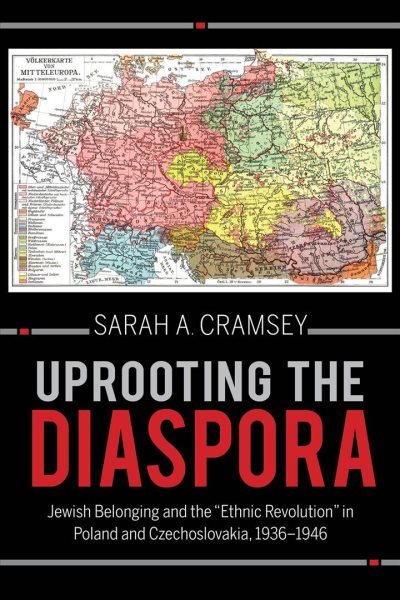
"In this deeply-researched and original book, Sarah Cramsey shows how the redefinition of Jewish identity after the Holocaust was part of an ethnic revolution that transformed Eastern Europe's shattered moral and political landscape. This is an important contribution to the history of European Jews, the creation of postwar Eastern Europe, and the complex relationship between nationality and statehood."
7 notes
·
View notes
Note
what would palachs music taste look/sound like
omg that's such a GOOD question *prepares to infodump* 🤭🤭
so a song I ABSOLUTELY associate with him is Morituri te Salutant by Karel Kryl (yeah it's in the film about him but that's not the only reason...it just FITS. THE LYRICS. THE MEANING. THE VIBES.) but that song officially came out some months after his death, so it's not sure whether he ever heard it (maybe some expert on czech music can help me out). but I can literally see him humming that song while walking around Prague (he had this habit of walking on the curb of the sidewalk and singing quietly to himself - soooo cute 🥹) so that's definitely number one
also Karel Kryl in general 😌😌
next maybe some classical music by Czech*oslovak composers? Something quite melancholic but beautiful about his homeland? Definitely 😌
I'm pretty sure he wouldn't like the playlists I make (emo/pop punk/goth/a lot of screaming and cursing (he never used swearwords) and sad angry music) - yeah not his thing probably 💀
with one exception - a song that comes to my mind which he might like is The Light Behind Your Eyes by My Chemical Romance (also very fitting lyrics/vibes 😌) and anything similar to that one, so more slow, romantic songs with deep lyrics
Also he would be the kind of person to care about the lyrics a lot in general
so...that's Palach's music taste imo, keep in mind that I'm not a historian (yet) nor did I know him personally (😭) so I can only guess 🥺
also if you have more questions feel free to ask, I'm always ready to infodump about Palach :)
3 notes
·
View notes
Text

Vlkova věž (which means 'wolf tower'), a watchtower in Znojmo, South Moravia
The Gothic tower is built in the 14th century and is 32 meters high. It was very important for the defence of the city.
Nowadays, an information center about wineries is located in the tower.
#znojmo#moravia#morava#south maravia#czech republic#czechia#česko#česká republika#czech#čumblr#czech history#česká kultura#jihomoravský kraj#building#tower#watch tower#architecture#gothic architecture#gothic#gothic style#medieval#medieval tower#history#historical#1300s#14th century#culture#medieval architecture#central europe#travel
12 notes
·
View notes
Text
CZ: Takže, poté, co mi jeden kamarád řekl, že nechápe, proč se tak moc slaví 17. listopadu, rozhodla jsem se udělat malé historické okénko, protože stejně ve škole na naše moderní dějiny nikdy není čas a vlastně jsme to nikdy nebrali.
28. října 1939 rozehnali nacisté demonstraci oslavující výročí vzniku Československé republiky. Během tohoto střetu byl těžce zraněn student Jan Opletal a zabit pekařský dělník Václav Sedláček. Jan Opletal zemřel 11. listopadu. Na jeho pohřbu 15. listopadu došlo k další demonstraci a střetu s nacisty. 17. listopadu byly zavřeny české vysoké školy, studenti byli zatýkáni a posíláni do koncentračních táborů, 9 vedoucích představitelů studentské organizace bylo popraveno. Roku 1941 byl díky snaze československé exilové vlády v Londýně 17. listopad prohlášen za Mezinárodní den studenstva.
Přesuňme se o padesát let později. Roku 1989 už komunistickému režimu v Československu docházejí po 41 letech síly, v SSSR je u moci Michail Gorbačov a poměry se uvolňují. Během roku 1989 dochází k několika demonstracím a protestním akcím (jedna z nich, slavící výročí úmrtí Jana Palacha, tzv. Palachův týden, byla obzvlášť brutálně potlačena). 17. listopadu se v Praze na Albertově sešli studenti pražských vysokých škol při příležitosti 50. výročí uzavření českých vysokých škol. Na akci byla skandována protikomunistická hesla, po skončení oficiální části se část studentů vydala do středu města. Policie se je snažila zadržet a zabránit jim v postupu. Ulici Národní třídu policie přehradila. Demonstranti se chovali pokojně, měli jen květiny a svíčky a skandovali: “Máme holé ruce!” Zvláštní složky bezpečnostních složek, tzv. červené barety, ale demonstranty napadly, zbily obušky a pokojnou demonstraci brutálně rozehnaly. Zpráva o tomto násilí se hned druhý den začala šířit, studenti a divadla začali stávkovat, konaly se demonstrace, vzniklo Občanské fórum. Komunistický režim tento tlak nevydržel. 10. prosince byla jmenována 1. vláda, kde komunistická strana neměla většinu a dosavadní prezident Gustáv Husák podal demisi. 29. 12. 1989 byl prezidentem zvolen Václav Havel (kterého komunistický režim naposledy zatkl v říjnu 1989).
Takže proto slavíme 17. listopadu. Pro jiné země to může být “jen” Mezinárodní den studenstva, ale pro nás je to den, kdy se naši předkové vzepřeli a ukázali, že mají odvahu a že svobodu a demokracii budou hájit. Je to den, kdy bychom si měli uvědomit, že jestliže oni nám vybojovali svobodu a demokracii, my musíme tyto hodnoty zachovat a dále budovat. Díky za pozornost.
EN: So, after one of my friends told me, that they don’t understand why we celebrate 17th November so much, I decided to create a post about our modern history, which we never have the chance to talk about at school because we don’t have time to do so.
On October 28, 1939, the Nazis broke up a demonstration celebrating the anniversary of the Czechoslovak Republic. During this clash, a student, Jan Opletal, was seriously injured and a bakery worker, Václav Sedláček, was killed. Jan Opletal died on 11 November. At his funeral on 15 November, another demonstration and clash with the Nazis took place. On 17 November, Czech universities were closed, students were arrested and sent to concentration camps, and nine leaders of the student organisation were executed. In 1941, thanks to the efforts of the Czechoslovak government-in-exile in London, 17 November was declared International Student Day.
Let's move on fifty years later. In 1989, the Communist regime in Czechoslovakia is running out of steam after 41 years, Mikhail Gorbachev is in power in the USSR and conditions are easing. During 1989, several demonstrations and protests took place (one of them, celebrating the anniversary of Jan Palach's death, the so-called Palach Week, was particularly brutally suppressed). On 17 November, students from Prague's universities gathered at the Albertov in Prague to mark the 50th anniversary of the closure of Czech universities. Anti-Communist slogans were chanted at the event, and after the official part of the event was over, some of the students went to the city centre. Police tried to detain them and prevent them from advancing. The street Národní třída was blocked by the police. The demonstrators behaved peacefully, carrying only flowers and candles and chanting, "We have bare hands!" However, special forces of the security forces, the so-called Red Berets, attacked the demonstrators, beat them with batons and brutally dispersed the peaceful demonstration. News of this violence began to spread the very next day, students and theatres went on strike, demonstrations were held, and the Civic Forum was formed. The communist regime could not withstand this pressure. On 10 December, the first government was appointed, where the Communist Party did not have a majority, and the incumbent president, Gustáv Husák, resigned. On 29 December 1989, Václav Havel (who was last arrested by the communist regime in October 1989) was elected president. So that is why we celebrate November 17.
For other countries it might be "just" International Student Day, but for us it is the day when our ancestors stood up and showed that they had courage and that they would defend freedom and democracy. It is a day when we should realise that if they won freedom and democracy for us, we must preserve and build on these values. Thank you for your attention
#czech history#history#international student's day#czech#česky#české dějiny#moderní historie#modern history#čumblr
175 notes
·
View notes
Text
Btw, today’s the 80th anniversary of Operation Anthropoid or as I like to call it the “Unproblematic Good Boi Day” or “Be the only ones to ever successfully yeet a high-ranking Nazi official and have him be one of the architects of the Holocaust to boot”—the assassination of the Reichprotektor and Hitler’s close ally Reinhard Heydrich by Czechoslovak operatives Jozef Gabčík and Jan Kubiš who parachuted to the Protectorate of Bohemia and Moravia from their exile in the UK and devised a plan which led to a failed shooting and then a semi-successful bombing of Heydrich’s car which in turn led to Heydrich dying a painful death in a Prague hospital for a week which resulted in a vengeful extermination of two villages and a wave of Nazi-conducted tortures and extrajudicial murders sweeping over Prague in order to sus out the partisans who ended up betrayed by one of their own and died during a shootout with Nazis in a Prague church which, FINALLY, led the Brits to realize that maybe gleefully handing Czechoslovakia over to Hitler wasn’t the best idea they ever had and maybe the low level of Czech resistance up until that point wasn’t a result of us being buddy-buddy with Nazis, proving once and for all that when it comes to finding allies who aren’t complete idiots, there are just no good options for Eastern Europeans to be had.
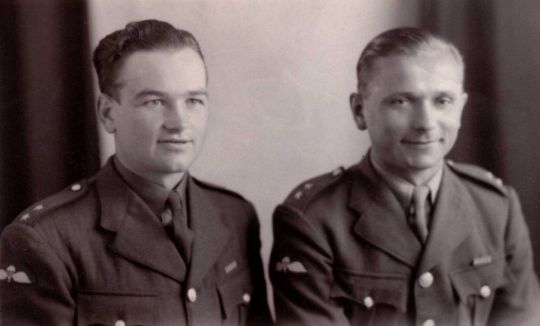
Anyway, celebrate the good bois.
50 notes
·
View notes
Text
Robin Hood of Bohemia ~ Interview with film director Leoš Kastner with reporter Kasia Ogrodnik-Fujcik
The adventures of Robin Hood have fired the imagination of filmmakers since time immemorial. Or, to be precise, since 1938 when they made the first famous film with Errol Flynn. There have been numerous versions of the story retold over the years. Little wonder it has also (and inevitably) made its way into foreign lands. In the Kingdom of Bohemia, upon the death of Přemysl Otakar II on 26…
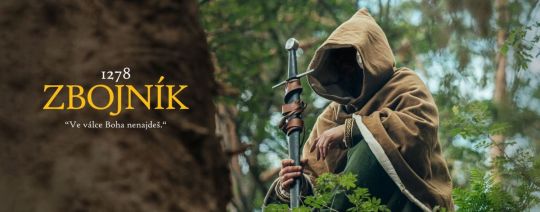
View On WordPress
#Bohemian history#Crusades#Czech history#Edward I#King of Bohemia#King of England#medieval history#medieval warfare#Richard I#Robin Hood#Zbojnik
3 notes
·
View notes
Text
JUST IN: Hra na Hrad, část 2: gotické období je venku!
(nebo teda na youtube, ale jakože chápeme se)
youtube
Bezejmenný protagonista se ocitá ve víru korunovace Karla IV. Prodají mu v krčmě pivo, i když mu ještě nebylo osmnáct? Jak si poradí s morálním dilematem, které prezentuje nedostatek dobových peněz? A bude celý můj input ke gameplayi skutečně spočívat pouze v tom, že opakuji do mikrofonu to, co už nám stačily sdělit postavy?
#hra na hrad posting#hra na hrad#čumblr#czech#czech history#pražský hrad#prague castle#česká historie#hezky česky#Youtube
6 notes
·
View notes
Text
On 30.9.1938 Nazi Germany took the territory of the former Czechoslovakia on the basis of the Munich Agreement.
On 30.9.2022 the Russian Federation took the territory of Ukraine on the basis of pseudo-referendums.
Don't tell me that history does not repeat itself!!
5 notes
·
View notes
Note
Hello,
Can you do 22 of the history asks :)
Much Love :)
Hi, thank you for asking and sorry for taking so long!
22. Random historical fact about the place you are at the moment
Hope I don't accidentally dox myself, but I'm currently here:
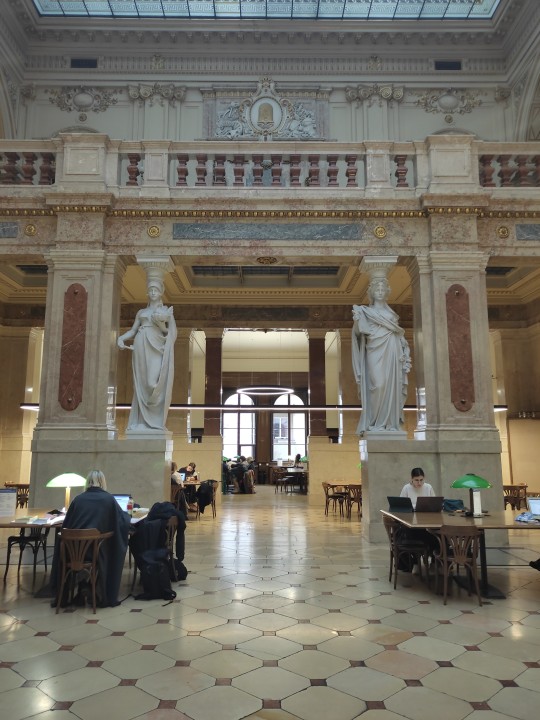
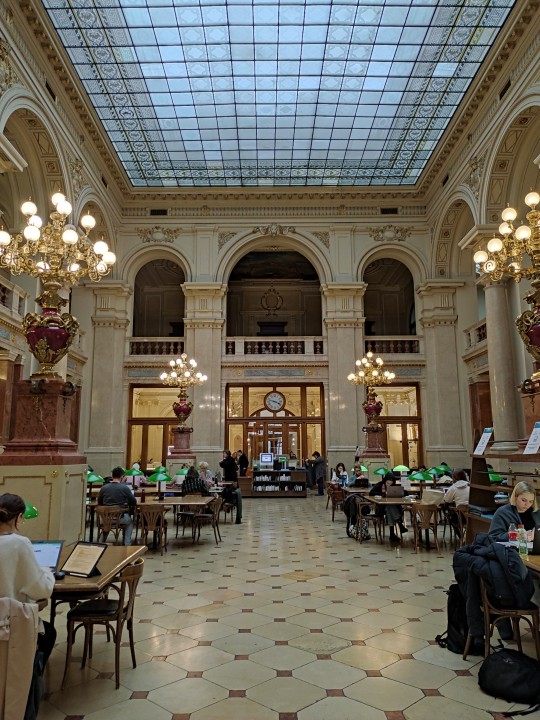
Aka the Library of Czech Academy of Sciences where I get to embody the dark academia aesthetic have a space to diligently work on my thesis.
Anyway, here's the random historical trivia: the two statues you can see in the first photo are apparently Thrift (Hospodárnost) and Frugality (Spořivost). That's because when the building was constructed in the 19th century, it first belonged to the Czech Savings Bank.
#thanks for the ask!#history#czech history#czech republic#czech#dark academia#asks answered#1800s#19th century#historical buildings
6 notes
·
View notes